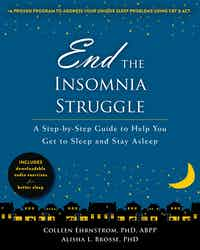By Alisha L. Brosse, PhD, and Colleen Ehrnstrom, PhD
Clients with chronic insomnia come to you exhausted, frustrated, and scared. They want to sleep better…tonight! Yet, you know that cognitive behavior therapy for insomnia (CBT-I) takes time to work. Even worse, clients may initially get less sleep with stimulus control therapy or sleep restriction therapy. How can you get your clients on board with a treatment that you know will work, if only they will do it?
You can start with the standard CBT-I practices of providing a strong rationale via psychoeducation and citing clinical trials. This will be enough for some of your clients to embrace the treatment. Others will remain too scared or pessimistic to dive in. Here are some strategies from acceptance and commitment therapy (ACT) that you can use to increase adherence to CBT-I.
1. Help your clients connect to their values. In your initial assessment you likely learned about the daytime consequences of your client’s insomnia, and what is most distressing about it. This provides a window into what really matters to this client. Is she distressed about the effect sleep deprivation is having on her work performance? Is he concerned about how irritable he is with his family? Is she fearful of the long-term health consequences? Connecting your client’s values to the sleep program may be just the nudge your client needs.
2. Use the process of creative hopelessness to help your clients recognize that their current approach is either not working or not sustainable. Your clients can probably rattle off a long list of what they’ve already tried. Then ask: as a result of all of these efforts, has your sleep gotten better or worse? Has your quality of life gotten better or worse? They already know the results if they continue to do what they are doing. Might they be willing to try something different?
3. Increase willingness to not sleep. When clients are terrified of not sleeping, they will continue to focus on short-term fixes at the expense of supporting their sleep physiology over the long term. You can use metaphors like tug-of-war with the "Insomnia Monster" or the "Chinese Finger Trap" to help them lean into their discomfort and accept whatever this night brings.
CBT-I is incredibly effective. We just have to get our clients to do it.
 Colleen Ehrnstrom, PhD, ABPP, is a licensed clinical psychologist who specializes in acceptance and commitment therapy (ACT). She is board certified in cognitive behavioral therapy (CBT), and works in the family program at the Department of Veterans Affairs in Denver, CO.
Colleen Ehrnstrom, PhD, ABPP, is a licensed clinical psychologist who specializes in acceptance and commitment therapy (ACT). She is board certified in cognitive behavioral therapy (CBT), and works in the family program at the Department of Veterans Affairs in Denver, CO.
Alisha L. Brosse, PhD, is a licensed clinical psychologist who specializes in behavioral therapies for a wide range of presenting problems, especially sleep, mood, and anxiety disorders. She operates a private practice in Boulder, CO, and directs a bipolar specialty clinic at the University of Colorado Boulder.


 2024 Peace Playbook: 3 Tactics to Avoid Clashes with Your Partner
2024 Peace Playbook: 3 Tactics to Avoid Clashes with Your Partner